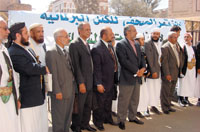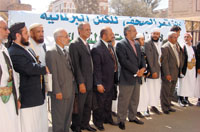
Opposition parties threaten to boycott next elections if proposed amendments pass [Archives:2007/1107/Front Page]
November 29 2007
 |
SANA'A, Nov. 28 – At a press conference held in front of Yemen's Parliament Tuesday, representatives from the opposition parties bloc threatened to resign from Parliament and resort to street protests.
The threat came amid a tense atmosphere that arose earlier this week within the Yemeni Parliament between members of the opposition parties bloc and the ruling General People's Congress regarding the 2008 state budget and the election law.
The tension within Parliament was evident at its Tuesday session when opposition parties refused to approve the 2008 state budget, maintaining that the purported budget never reflects the true incomes or expenditures and that it is full of falsities and negatives.
They further affirmed that the budget is incapable of representing citizens' basic requirements, holding the ruling party and its majority responsible for such an illusory budget.
The opposition bloc further disclosed clear fallacies in state income, explaining that the government estimated a barrel of oil at $55 when its real price is $90.
Members of the opposition bloc walked out of Monday's parliamentary session as a sign of their rejection of a GPC initiative to amend the election law and form the Supreme Elections Commission, which, according to the proposal, consists of judges instead of representatives of political parties holding seats in Parliament.
Comprised of five opposition parties, the Joint Meeting Parties bloc threatened in a press conference to resign from Parliament and resort to street protests if the ruling party insists on passing the proposed election law amendments.
“If the ruling party insists on doing this, then we boycott the elections, the presidency and democracy,” declares senior JMP leader Sultan Al-Atwani, adding, “The GPC simply was wasting time and trying to soothe public frustration via its seeming dialogue.”
The opposition bloc further threatened to use “all legal avenues to confront the amendments,” admitting that such a step could result in tension and divisions.
Yemeni Socialist Party member Mohammed Ali considers the election law amendments a coup against democracy and against the multi-party system guaranteed by Yemen's Constitution.
Ali further regards the purported developments occurring within Yemen's judicial system as merely “window dressing,” pointing out that only the president may appoint and dismiss judges.
In response, the ruling party's GPC bloc, which comprises a majority in Parliament, accused opposition representatives of insulting both the Yemeni judicial authority and the Supreme Elections Committee.
——
[archive-e:1107-v:15-y:2007-d:2007-11-29-p:front]


